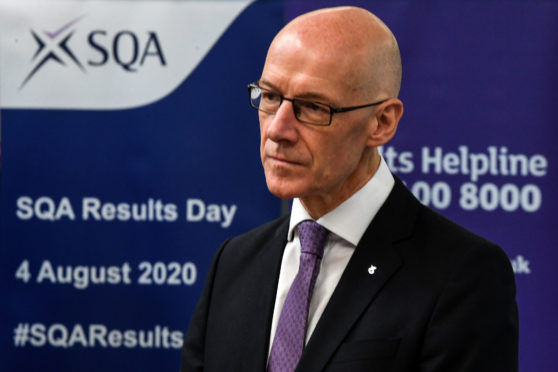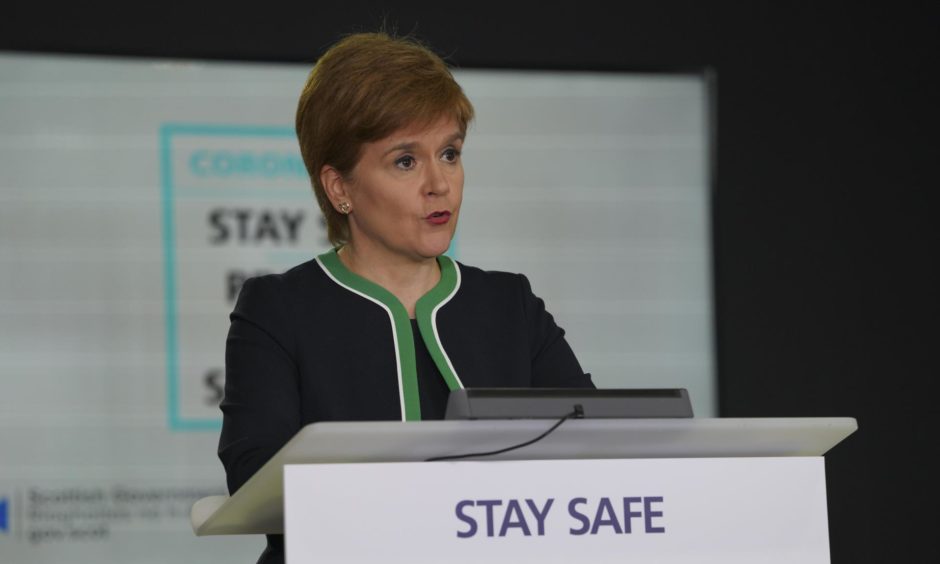As far as humiliating U-turns go, there can’t have been many more spectacular than John Swinney’s volte-face on the exams fiasco that has plagued pupils over the last few days.
It was a handbrake turn worthy of a rally driver negotiating a hairpin bend at 90 miles per hour to the sound of screeching tyres and the smell of burning rubber.
The Education Secretary struck a tone of contrition as he apologised to the youngsters affected and announced the withdrawal of all downgraded results.
But after a stormy Holyrood session that involved more calls for Mr Swinney’s resignation, two key questions remained.
Firstly and most importantly: had Mr Swinney done enough to satisfy the furious pupils, whose hopes for the future had been dashed in cruel fashion by the Scottish Qualification Authority’s (SQA’s) moderation of the grades they had been allocated by their teachers?
Secondly, was Mr Swinney’s U-turn enough to save his political skin?
As far as the second question is concerned, already it appears the scale of Mr Swinney’s climbdown has been enough to persuade the Green Party to vote for him when MSPs consider a vote of no confidence on Thursday afternoon.
“He delivered everything we asked for and we will not vote against him,” a Green insider said.
Mr Swinney’s decision to reverse the original plan to downgrade the results of 124,564 pupils while maintaining those grades which had been moderated upwards helped buy himself Green support.
The Education Secretary was further helped in that regard by his promise of getting Professor Mark Priestley of Stirling University to review how the cancellation of exams was handled during the coronavirus pandemic.
The support of the six Green MSPs should be enough to prop up Mr Swinney and enable him to fight another day as Education Secretary, despite the opprobrium heaped against from all other corners of the parliament.
As for the first question, clearly Mr Swinney’s reinstatement of teachers’ estimates will cheer those pupils who justifiably felt they had been extremely harshly treated by the SQA “algorithm”, which had wrecked their dreams.
There will, however, be wider ramifications. As a result of the U-turn, the pass rate will soar this year. So the National 5 pass rate will be 88.9%, 10.7 percentage points higher than 2019. The Higher pass rate will be 89.2%, 14.4 percentage points higher than 2019. While the Advanced Higher pass rate will stand at 93.1%, 13.7 percentage points higher than the previous year.
This came with a pledge that these well-qualified young people will not be “crowded out” of university places, a promise that will have significant financial implications. There is also the question of what happens to pass rates next year? How can the system remain fair?
But from a political point of view, Mr Swinney had no option other than to perform his about-turn. Not only was his own career at risk, there was also May’s election to consider. The anger directed against the Scottish Government over this farce threatened an SNP election victory that had previously been considered a foregone conclusion.
Moreover, as Mr Swinney acknowledged, there was a real risk that working class children would lose faith in the exams system as the route out of poverty.
But the reality was that Nicola Sturgeon has staked her political reputation on sorting out education and closing the attainment gap. Going into an election and defending a system that had resulted in Higher pass rate for the poorest pupils falling by 15.2% and only 6.9% for the richer pupils was simply not an option for the SNP.
Therefore, changing course was the most effective way to take care of a problem that was threatening to get out of hand.
Even so, this episode has done nothing but harm to the Scottish Government’s reputation and raises more questions about its handling of domestic issues that matter so much to voters.
It was only last week that Ms Sturgeon referred to the inflated pass rates that will now stand thanks to her government’s change of tack as “not credible”.
Along with Mr Swinney, she spent the best part of a week defending the original grades before bowing to political pressure when her Education Secretary’s career was put on the line.
It has been an unedifying few days in Scottish politics. And despite the Scottish Government’s dramatic efforts to solve the problem, it will be added to the growing list of education controversies that have sprung up during Mr Swinney’s spell in charge of schools.



